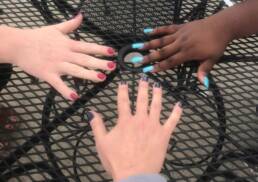At Allies we often say that trauma that has happened in the context of a relationship must also be healed through a relationship which is why we care so deeply about mentoring young survivors of trafficking and sexual exploitation. “Sex trafficking (in children) occurs when someone uses force, fraud or coercion to cause a minor to commit a commercial sex act. A commercial sex act includes prostitution, pornography, and sexual performance done in exchange for any item of value, such as money, drugs, shelter, food, or clothes.” (Shared Hope International). It’s also true that survivors typically care deeply for their traffickers, which are often referred to as “pimps”. These individuals can be family members, romantic love interests, or people they’ve met online offering promises of protection, adventure, love, housing, and other economic opportunities.
Sex, by nature, is relational, and the relationships built between traffickers and their victims can be confusing and, at the time, essential to their survival so Allies’ mentees have, without a doubt, experienced variety of traumas through relationships.
Trauma is a complex result of continual abuse that affects a young, developing brain in a multitude of ways, therefore, it can be difficult to navigate life after “the life” for survivors. It’s quite literally what Allies exists for, though. When a volunteer commits to participating in our trauma-informed mentorship program, they’re committed to learning and unlearning, listening and sitting in silence, and walking alongside their mentee through the hills and valleys of life with no other agenda than to be a loving support to them.
That doesn’t mean mentors meet their mentee and 3 months later their mentees look and act just like them. No, Allies mentors walk consistently with their mentee meeting them right where they’re at, offering unconditional love, support, and guidance regardless of the circumstances they’re faced with.
____
That was true for Susanne* and Zayla*, two mentors in the program whose mentees joyfully connected with them, attended events with them and called them when their residential facility offered “phone time”… until they didn’t.
Susanne and her mentee, Ava*, 17 years old, often shared laughs when they spent time together, but there were multiple evenings where Ava would call her mentor to talk about the hard reality of losing her mom to a recent drug overdose. Ava’s lonely thoughts were always met with Susanne’s tender kindness, empathy, and love she had for her mentee. While she knew there wasn’t anything she could do to change Ava’s situation or step into that mothering role for her, she recognized that she could be present with her and show her support as she worked through that grief. And that’s what Susanne did, and continued to wait for, when Ava stopped getting in contact with her shortly after her 18th birthday.
Simultaneously, Zayla, another mentor, was building a friendship with Camilla*, 17 years old, virtually as they met in the height of the global pandemic. The match had standing weekly meetings where they’d get on the video call to play games, talk about their week, and work through goals and college applications. After Camilla graduated from the program she was participating in, she went to live with a foster family in town and the two continued to connect virtually. After a few months of spotty connection, we learned that Camilla had left the foster home and her whereabouts were unknown. When she did resurface, she was pregnant and back in residential placement, and Zayla reconnected with her until Camilla decided she’d like to focus on her pregnancy and romantic relationship, which was out of state at the time. Camilla expressed her gratitude for Allies’place in her life at the time and we went our separate ways, honoring her request.
____
That was nearly a year ago.
When Camilla reached back out to Allies after all that time, we were ecstatic. We immediately reconnected with her and got to meet her 1 year old daughter. She jumped right back in and attended program events, connected with Zayla, and even advocated for services for a friend she’d met back in the residential program that she kept up with since their individual graduations. Due to policy, there were some barriers we needed to navigate, but once we worked through them we discovered that the friend Camilla wanted Allies to connect with was Ava.
We were thrilled for this opportunity to share space with both of these young ladies again. Now young adults, both girls still have unique challenges to overcome, but we’re thankful that Camilla remembered that we had stood by her and took a chance at reconnecting with us. Because she took that risk, Ava had a trustworthy friend to help her reconnect to Allies, too.
Mentoring survivors of complex trauma isn’t always a straight path to healing. It takes coming and going and waiting and pursuing, but when we do these things, we can become a soft place to land, a safe place to begin healing, and a place of belonging for young survivors. That’s the impact of mentoring at Allies and what both Susanne and Zayla have been to their mentees.


